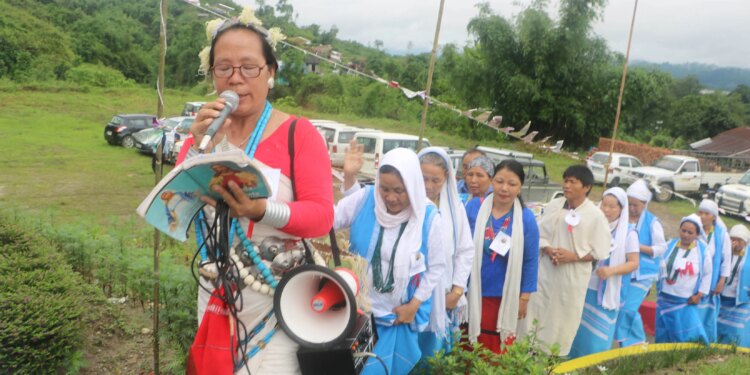Bangalore, India, Jan 14, 2025 / 14:30 pm
Amid prospects of revival of an anti-conversion law passed in 1978, Christian leaders of Arunachal Pradesh state in northeast India expressed little concern over the development.
“We are the major religious community in the state and we do not expect the government to bring in harsh clauses to trouble us while implementing the court order,” Miri Stephen Thar, the Catholic president of the ecumenical Arunachal Christian Forum, told CNA on Jan. 14.
The revival of the dormant law, passed by the state legislature, has been brought about by the Guwahati High Court, which ordered the state government in September to “frame rules” within six months to implement the law.
The order came after a petition brought by an Indigenous rights activist.
In India, a law can be implemented only after “rules” to enforce it are framed and announced. But since this process had not been followed in Arunachal Pradesh, the conversion law has never been enforced since it was passed 46 years ago.
The latest development drew media attention on Dec. 27 when state Chief Minister Pema Khandu, heading the Hindu nationalist Bharatiya Janata Party (BJP) government, declared that his government will fulfil the order of the high court.
Khandu made this announcement while addressing the silver jubilee celebration of the Indigenous Faith and Cultural Society of Arunachal Pradesh in Itanagar, the state capital.
Though anti-conversion laws have been enacted by a dozen states, most of them in Hindu nationalist BJP-ruled states from the early 2000s onward, the law has been dormant in Arunachal Pradesh due to the legal flaw.
Compared with stringent laws passed in BJP-ruled states, the Arunachal anti-conversion law remains somewhat innocuous, prohibiting “conversions through force, inducement, or fraudulent means.” It directs a maximum punishment of two years.
New legislation in other states has made prior permission from government officials mandatory for conversion, made prosecution easier, mandates that the burden of proof be shifted to the accused, and orders stringent punishment — including up to life imprisonment — and high penalties.
“We held a meeting of the Christian legislators [Jan. 13]. Seven of them attended,” said Thar, who is based in Itanagar.
A meeting of all the 19 Christian legislators including seven belonging to the BJP in the 60-member state assembly, Thar said, “will be held soon to discuss our strategy to deal with this surprise development.”
“We will also hold a state-level convention soon to formulate Christian strategy to lobby with the government as anti-conversion laws are being misused to persecute Christians in several states,” Thar told CNA.
Studies say Christians are the largest religious group in the mountainous Arunachal Pradesh situated in the far east of India in the foothills of the snow-capped Himalayas, bordering China, Bhutan, and Myanmar.
Over 40% of the state’s 1.7 million people — mostly tribal inhabitants — are Christians. Ethnic tribals professing “Indigenous faith” form the second-largest demographic, followed by Buddhists and others.
“The government is duty bound to act on the high court order and frame the rules. That is a legal requirement,” Salesian Bishop George Palliparambil, who heads the Miao Diocese in the state, told CNA.
(Story continues below)
Subscribe to our daily newsletter
“The Christian community is powerful and diligent to guard against any misuse of the provisions,” Palliparambil said.
In India’s most populous state of northern Uttar Pradesh with a population of 231 million, hundreds of pastors and even senior Catholic priests had been imprisoned on conversion charges.
“The chief minister Khandu is a Buddhist and is known for respect for all communities. He would not turn the anti-conversion law into a tool to persecute Christians by fulfilling the court order,” Bishop John Thomas Kattrukudiyil, who retired as bishop of Itanagar in 2023, told CNA.
Kattrukudiyil noted that Khandu had even promised to repeal the anti-conversion law when he addressed the Catholic celebration of the decennial memorial service of pioneering Catholic missionary Prem Bhai in 2018.
On the occasion, Khandu had also expressed concerns that the law “could undermine secularism and is probably targeted towards Christians.” He ultimately never repealed the law.
Credit: Source link





